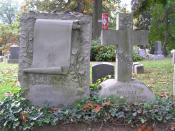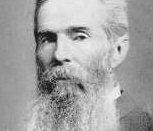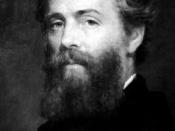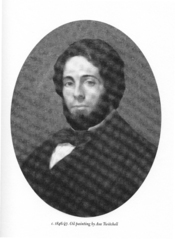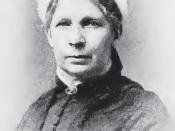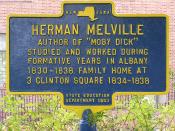Herman Melville is best known for his novel entitled "Moby Dick."ÃÂ However, this diverse and talented man also wrote poetry. Some poems of his stand out as an example of his fine writing: "Shiloh,"ÃÂ "The College Colonel,"ÃÂ "Formerly a Slave,"ÃÂ "The Conflict of Convictions,"ÃÂ and "The March Into Virginia."ÃÂ and These poems condemn slavery, show the harshness of battle, and the emotions of post war life. Melville uses powerful images and symbolism to describe these situations. Due to his northern upbringing, he talks about the feelings of the people who fought in the war and innuendos of the institution of slavery and the slaves themselves through his descriptive poetry.
Firstly, Herman Melville's Civil War poems were partly influenced by his crushingly blue-collar childhood. Melville was born into a wealthy merchant family in New York City. However, this upper-middle class household did not last long into Herman's life because when he was twelve, his fathers business went bankrupt and soon after that, his father went insane and died (Discovering Authors).
When this happened the burden of supporting the family fell on little Melville and he bounced form job to job making minimum wage. In his spare time, he would examine Shakespeare, and he was a great lover of history. One can gather from his northern working class life that he would be opposed to slavery; also, with his love for history he deduced that slavery not only wrong but inhumane. Being the educated man he was, he protested that young men should not be fighting in "The March into Virginia"àwhere he says, "All wars are boyish, and are fought by boys"æ No berry party, pleasure-wooed, no picnic party in May"à(Bloom 108). Herman Melville's childhood was the foundation for his principles later in life.
Moreover, Herman Melville's Civil War poems were all favoring the union and put down the confederate south. This theme was undoubtedly contrived in his childhood growing up in the union north. In Herman's time, most northerners were working people who strongly opposed slavery. So obviously, when Melville began writing, his poems would have a northern approach, which they did. While Herman Melville knew war was bad, he also had the knowledge that so too was slavery and it needed to meet its demise. Melville's poems were of the most significance to our country and he could not have done it with out his childhood in the union north.
The poem "Shiloh," written by Herman Melville, illustrates war in a questioning fashion. "Shiloh" shows how the tone of a battle can change in a matter of minutes and how the attitude of the soldiers can change just as quickly. Battles during the Civil War were very enthusiastic. One can just imagine the piercing cries of charging soldiers, the thundering blast of canons, and the sounds of thousands of rifles firing in succession. There is no doubt that the intensity and energy felt during the heat of battle is heart pounding. The poem illustrates how that intensity can change to gentleness in a matter of minutes. It depicts scenes from a battle after it is over. "April Rain Solaces the parched ones,"ÃÂ (Melville) "Swallows fly low over the field in clouded days,"ÃÂ (Melville) quotes like these create a gentle, serene feeling about the battle scene. Rain, birds, and a church, the passion of the battle is no longer fierce, intense, and murderous, but is calming, relaxing, and mournful. The attitudes of the soldiers are also very whimsical. In the heat of battle, soldiers have a strong sense of pride. During battle, they fight with heart and strength. Soldiers are put to the test and fight with honor. This part shows how the attitude of the soldiers can change in a matter of seconds. Before and during battle, soldiers are riled up and very energetic. This is because they believe they are being brave and courageous by honoring their country. "Shiloh" questions that by asking, how passionate can war really be if the tone of the battle and the attitude of the soldiers can change instantly? Melville also honors the dead, and at the same time, it questions the cause for why they are dead.
In "The College Colonel"ÃÂ, two similes and metaphors are used to describe the colonel and his regiment. In the second stanza, the soldiers are said to be "Like castaway sailors."ÃÂ (Melville) This simile fits the soldiers well because it gives the reader a picture of tattered soldiers returning to a home they are no longer familiars with it. Melville also uses a metaphor to describe the colonel. "An Indian aloofness lines his brow," (Melville) shows how the colonel has aged too quickly because of the emotional and physical pain he received from the war. The theme of this poem says that actually to live through the war battles is much more painful that watching from afar and rejoicing when battered soldiers come home. No matter how glad or relieved a colonel and his soldiers are to come home, because "Their mates dragged back and seen no more, " (Melville) they will never forget what they saw during the war. The families and friends that rejoice as them come home will never be able to understand their pain.
In the poem "Formally a Slave"ÃÂ The first stanza sets the scene. Rather than just describing a single person (the woman in the picture), Melville uses her as a single symbol for the entire race of enslaved people. "The sufferance of her race is shown"(Melville) in her face. Along with that, the picture suggests that she and her race's history is thick with turmoil. Deliverance from slavery, for her, comes too late, for she cannot enjoy it. However, "she is not at strife"(Melville) which suggests that she is happy with her life, despite her history and late liberation. The second stanza is more uplifting. "Her children's children they shall know / The good withheld from her" (Melville) tells that it will take a long time for the black people to be accepted into society, and to be seen as something other than as slaves. Yet she seems to know what good the future generations will experience as she sits quietly: "Her reveries takes prophetic cheer / In spirit she sees the stir."ÃÂ (Melville). The third stanza wraps it up neatly, as it is the last. It talks about the span of time: "the depths of thousand years," (Melville) and with its tone, alludes to the horrible injustice of slavery. Yet it winds its way back to the black woman in the painting, and describes her as lit with a sort of religious light, making the scene appear "sober," solemn, and contemplative. Her face it "dusky" (Melville) because of her ethnicity, as well as after a lifetime of hard labor as well as all the stress and sorrow that go along with it. She is yet again being directly called a prophet; a "Sibylline" (Melville) is a trusted female prophet. Yet, although she has this important aura about her, she is illustrated as benign, or harmless and sweet. The tone of the whole poem condemns slavery in general. It focuses on the humans involved, and the greatness of their liberation. The black woman is portrayed as noble and gentle, and somehow a prophet. Melville's message against slavery as well as for the people comes across strongly.
Moreover, in Herman Melville's "The Conflict of Convictions"ÃÂ he portrays his omniscient thoughts of Civil War. Herman not only knows war is immoral, in this poem he examines deeper finding out that the victory of the Civil War by the north may deceive the cause which they were fighting.
"Power unanointed may come- Dominion (unsought by the free) And the Iron Dome Stronger for strew and stain, Fling her huge shadow athwart the main; But the Founders' dream shall flee"ÃÂ(Bloom 108).
In this, Melville is saying that while the north's initial cause might have been just, they have strayed from it throughout the coarse of the war. In addition, Melville portrays the Iron Dome stronger for stress and stain, may fling it huge, imperial shadow across the main, blocking the Union's sight of what it started to do (Bloom 111). In this poem, Herman Melville exhibits his astonishing ability to interpret the Civil War.
Furthermore, in the poem "The March into Virginia,"ÃÂ Melville expresses his overbearing feelings that young people should not be involved with the fighting aspects of the war. Moreover, he also says that boys that try to be heroes are simple foolish and unwise.
"All wars are boyish, and are fought by boys"æ No berry party, pleasure-wooed No picnic party in May Ever went less loath than they"à(Melville).
In addition, in this poem he conveys his idea of the bad result against the good act. This was extremely evident in Melville's time because the Union meant well with their actions of ending slavery; however, the result was devastating, bringing the country to its knees. He demonstrates his poetic prowess in this masterpiece.
Conclusively, Herman Melville's upbringing in the north inspired his works pertaining to the civil war. His works such as "Shiloh,"ÃÂ "The College Colonel,"ÃÂ "Formerly a Slave,"ÃÂ "The Conflict of Convictions,"ÃÂ and "The March Into Virginia,"ÃÂ reflect how he actually feels towards slavery and the war itself. Some of his poems may seem rather melancholy but what could one expect with a
